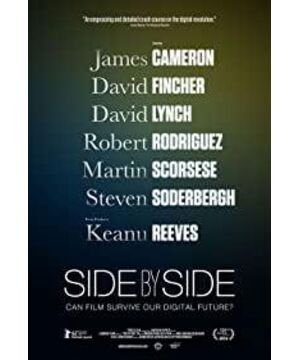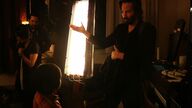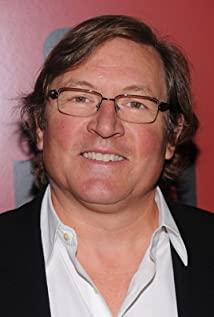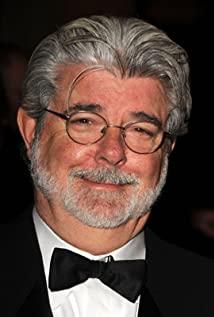All the physical things, physical and physical contact, make me feel spontaneous, primitive and rough comfort. I firmly believe that pen and paper writing, paper books, CDs, cinemas, and film will always shine in the waves of the times.
I remember the 40-degree summer when I was in junior high school,
It was 2009, and I was sweating profusely and ran all over Changsha to find a photo studio that could develop film.
Personally, I am very conventional, and I always have an irresistible fascination with things with a taste of time. The reunion of the moment of pressing the shutter and the time of developing the photo strongly stimulates the secretion of my adrenaline. Even though there is no escaping to pick up the DSLR in the end because it's faster and has an immediacy of punch, I'm still thankful to be able to leave an inch on the crossroads of the film and digital eras.
(This documentary has finished talking about the film for five thousand years, and the volume is too large. From the pre-production to the post-production, any topic can be taken out and discussed. It is also a two-hour documentary. I am very grateful to the director for giving the audience unlimited room for free thinking.)
First update a misunderstanding (anyway may just be my own misunderstanding),
"Film=Noise=Low Quality". This is true for most consumer-grade film photos. There is a gap between 10,000 Nokia 3310 cameras and Hasselblad between "photography" of "consumer level" and "photography" of "movie level".
In fact, film has more saturated colors and greater latitude (in theory, infinite latitude) than digital.
This starts with the principle of imaging. Every silver salt particle on the film can undergo chemical photosensitive imaging. The information recorded in the process of this series of chemical reactions is infinite, so the details retained and the freedom of manipulation are also infinite. However, the information recorded by the digital photosensitive element performing physical photosensitive sensing is still within a countable range, no matter how many pixels and rich color levels there are.
For those who have never touched a film machine like me, it may have been difficult to understand the silence on the set, only the film box creaked and turned as if being swallowed by time. It is impossible to understand the time when the film was carefully unloaded and replaced with a new roll of film. I can't understand the anxious joy of waiting until the next day after the printing studio to see the sample, and I can't understand that the editing is really "editing" with scissors and tape.
In 2016, China's last film production line was closed, and "Yangtze River" in the previous two years has advertised itself as the last film in China. It's not that the filmmakers are unwilling, but that except for Jack Ma who can say "out of interest" to make a movie for fun, it's hard for anyone in China with a lot of money and stupidity to be willing to make film. The pressure of the market deprives later people of enjoying these pleasures. rights, and inevitably push the film to the digital end.
However, it is worth celebrating that the huge difference between film and digital has been gradually smoothed out with the development of technology. Differences in latitude and detail within the visible range of the human eye have been caught up, while digital, on the other hand, has overwhelmed film in terms of handling.
Anthony Dod Mantle, DP for Dogma95 with Lars Von Tier, talks about his experience with DV for the first time - it was the purest feeling of being overwhelmed by the technology. The small DV machine was in Anthony's hand, and in the dark he swept across the court, through the crowd, with wanton movement, this "gothic immediacy", this "emotional movement" seemed to ignite the fire of Prometheus of holiness and sublime. Moving.
Since 2009, Slumdog Millionaire was the first Oscar-winning film shot entirely digitally, the digital evolution has been overwhelming. Whether it's ARRI or RED, digital machines have impeccably defeated film, both technically and emotionally. (Aside from the metaphysical perceptual aspect of film-like air and breath.) There is no gentle and delicate film texture that cannot be adjusted by Da Vinci. When Cameron created "Avatar", he always Waiting for the numbers to be updated, waiting for the lingering picture to be realized with the help of technology. Digitalization DO “give people new ways to dream”.
And, how to deal with the relationship between Technology&Art?
To answer this question, we need to go back to the discussion of film ontology.
Transformers producer Lorenzo di Bonaventura discusses this in the film - "There's less good, more bad. Because everybody's able to do whatever they want to do. The democratisation of it, fantastic. But I think my kids will suffer. They won't have the quality we had growing up because there isn't somebody there... there isn't a tastemaker involved…"
(By the way, I recommend an article to read, and the connotation and extension of the word tastemaker are exquisitely satirized http://www.cineoutsider.com/articles/stories/w/waving_and_drowning.html )
Where is the bloody tastemaker? The development of science and technology has brought more "democratisation", we who hold 5D or A7SII in our hands seem to have the capital to shout fuck film school, and the development of science and technology is also awe of art perish. But I would like to believe that individual differences are greater than groups. If you are willing to dedicate your life to art, all roads will lead to Rome. Art is advancing through continuous breakthroughs and explorations, and it is undeniable that new technologies can bring surprises to art. Art is the author's worldview, the indexicality between the final presentation of the work and the author's worldview, and the intertextuality generated by the audience's understanding based on their own experience.
We have never met, but we will always miss celluloid.
View more about Side by Side reviews











